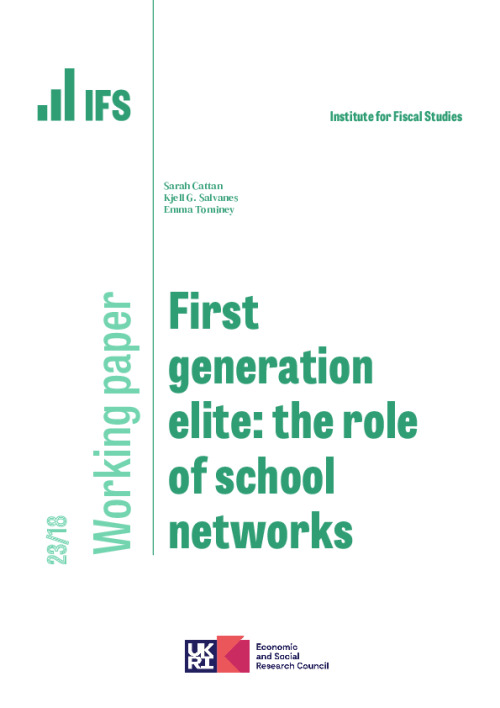Downloads

WP202318-First-generation-elite-the-role-of-school-networks.pdf
PDF | 745.86 KB
High school students from non-elite backgrounds are less likely to have peers with elite educated parents than their elite counterparts in Norway. We show this difference in social capital is a key driver of the high intergenerational persistence in elite education. We identify a positive elite peer effect on enrolment in elite programmes and disentangle underlying mechanisms. Exploiting a lottery in the assessment system, a causal mediation analysis shows the overall positive peer effect reflects a positive effect on application behaviour (conditional on GPA), which dominates a negative effect on student GPA. We consider implications for income mobility finding that encouraging further mixing between elite and non-elite students in high school could improve mobility across the whole distribution.
Authors
Working Paper details
- DOI
- 10.1920/wp.ifs.2023.1823
- Publisher
- Institute for Fiscal Studies
Suggested citation
S, Cattan and K, Salvanes and E, Tominey. (2023). First generation elite: the role of school networks. 23/18. London: Institute for Fiscal Studies. Available at: https://ifs.org.uk/publications/first-generation-elite-role-school-networks-0 (accessed: 30 June 2024).
More from IFS
Understand this issue

Sure Start achieved its aims, then we threw it away
15 April 2024

What does the Conservative's higher education announcement this week mean for apprenticeships and 'low-value' university courses?
1 June 2024

Election Special: Is there a 'conspiracy of silence' between both parties?
6 June 2024
Policy analysis

Free breakfast clubs in schools: what Labour’s plans would mean for pupils and families
25 June 2024

The uncertain course for school and college funding over the next parliament
19 June 2024

How should we interpret parties’ public spending pledges this election?
23 June 2024
Academic research

Income inequality in Ireland, 1987–2019
28 June 2024

Components of the evolution of income inequality in Sweden, 1990–2021
28 June 2024

The impact of labour demand shocks when occupational labour supplies are heterogeneous
28 June 2024

